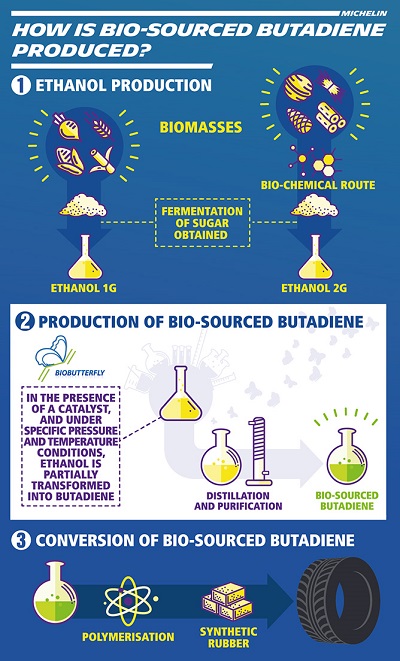October 29, 2019 |
Michelin : pilot plant to produce bio-sourced butadiene
The BioButterfly project launched by Michelin in 2012 has just achieved another milestone: the construction of France's first industrial pilot plant capable of producing butadiene from ethanol. The goal is to replace oil-based raw materials used in the company's tyres with bio-sourced molecules.
The BioButterfly project has just reached a new milestone. After developing this new technology to produce bio-sourced butadiene from ethanol on a pilot scale, the project is now moving into a validation phase, with the construction of a demonstrator at Bassens, in France.
Scheduled for completion in late 2020, this demonstrator plant will enable annual production of 20 to 30 tons of bio-sourced butadiene. It will also validate the industrial process on both technical and economic levels. By mid-2021, the first butadiene batches will be available.
Since its launch in 2012, and until the end of the project in 2022, Michelin and its partners, IFP Energies Nouvelles and Axens, backed by the ADEME (French Agency for the Environment and Energy Management), will have invested nearly 70 million euros. In the validation phase alone, the project will create over twenty jobs on the Bassens site.
REDUCING CO2 EMISSIONS LINKED TO TYRE PRODUCTION
The BioButterfly project will help to reduce the use of butadiene derived from oil-based products, by replacing it with butadiene produced from alcohol obtained through fermentation of plant biomass. In addition, this replacement will lead to a reduction in CO2 levels linked to tyre production.

This project is part of the Michelin group's key objective to increase the rate of raw materials derived from sustainable development sectors in tyre production.
ENVIRONMENTALLY-FRIENDLY TECHNOLOGIES
The demonstrator currently being set up in Bassens will be able to run on ethanol obtained from all types of biomass, namely ethanol 1G from beets, corn and wheat and 2G ethanol produced from forestry and agricultural waste such as straw, wood chips, and corn stalks. This approach presents the added advantage of not using additional agricultural land, which could be used for food production.
Towards a commercial licence
Technology developed in the context of the Biobutterfly project is the subject of an agreement between the partners who authorised the Axens group to commercialise the licence for bio-sourced butadiene production. Consequently, the procedure will be available to the petroleum and petrochemical industries and will increase its reach and positive impact on the environment.

